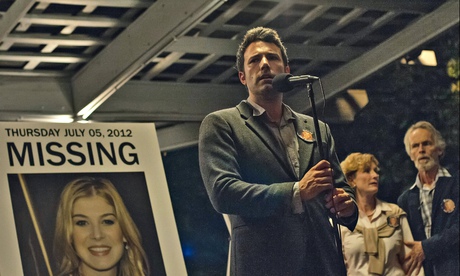
The spirits of Highsmith and Hitchcock hover over this outrageous pulp suspense-thriller from David Fincher, episodically structured around twists and counter-twists, like an addictive boxset of a TV drama. The movie reminded me a little of Steven Bochco’s small-screen classic Murder One, or indeed House of Cards, the series Fincher produced and partly directed, which is a domestic study in media-political homicide. Gillian Flynn has adapted her bestselling page-turner for the screen, and it is stuffed with mysteries, cliffhangers and very enjoyable performances, along with some sleeping-with-the-enemy provocations and nightmares of misogyny. Rosamund Pike delivers a fascinatingly poised performance as the gone girl herself – the missing piece in a jigsaw of fear, but a character whose potency exponentially steps upward. With her sculpted beauty, Arctic blonde sexiness and wide, almost lidless stare, Pike is Tippi Hedren 2.0, expressing a desperate unhappiness beneath her flawless perfection.
She is Amy Dunne, a beautiful magazine writer married to fellow journalist Nick, played by Ben Affleck. Thanks to the recession they’ve been laid off from their jobs in New York and humiliatingly moved back to Nick’s hometown in the midwest, where he is forced to make ends meet by managing a bar with his acerbic sister, Margo (Carrie Coon). When Amy goes missing, Nick gives televised press conferences pleading for information about her. But the media decide that he appears to be insufficiently upset. The movie interleaves this situation with flashbacks from Amy’s diary, showing how their marriage had been unravelling and how career failure has turned Nick into a drinker with a violent temper. So the whisper begins: did this guy murder his wife?
Fincher creates a drumbeat of disquiet around this troubled relationship, making a movie that, before and after its rupture of violence, also behaves like any indie satire of suburban discontent, with bizarre, almost farcical, incidental detail. He is adroit at summoning up the looming, teetering anxiety and a presentiment of pure evil. This is explicit enough in Fincher’s movies such as Seven and Zodiac, but I always think there is something Mephistophelean, or at any rate Fincherean, in Sean Parker’s famous offer of undreamed-of wealth to the Facebook inventors in The Social Network: “A million dollars isn’t cool. You know what’s cool? A billion dollars.” That same whiff of sulphur is here.
There is a great scene, recounted in flashback from the viewpoint of Amy and her girlish, ingenuous diary, of their initial meeting. The couple get talking at a party, and Nick impulsively takes her out on a magical midnight stroll through the city, past a bakery where they get caught in a “sugar cloud”, which Nick wipes off Amy’s lips before he kisses her. That should be a wonderful memory, but it has been reconfigured by violence and the loss of innocence; Fincher demonstrates how the encounter is unbearably sinister in this new context, the sugar turned into a miasma. A little later, in the bright springtime of their relationship, the couple become humorously oppressed with the knowledge of how adorable they are: “We’re so cute I want to punch us in the face.” The director shows how the punch has only been temporarily withheld.
Fincher and Flynn work in subsidiary characters, whose lighter qualities are expertly judged, so the film does not become overloaded with horror, and so it can maintain its palatability and stamina over a two-and-a-half-hour running time. The investigating officer, Detective Rhonda Boney, is nicely played by Kim Dickens: a sceptical cop with a shrewd sense of when to rattle the suspect’s cage and when not to make an arrest. And Tyler Perry is very funny as Tanner Bolt, Nick’s gung-ho, media-savvy lawyer, always on the alert for how his client might manage the situation proactively, launching a faux-confessional aria on the very TV talk show that had pilloried him.
Another type of movie might take the mystery forward in just one or two more stages: Gone Girl has chicane plot reversals and switchbacks that Fincher pretty much keeps within the bounds of plausibility. Although the availability of a certain weapon finally challenges credibility, the movie never jumps the shark. Together, Affleck and Pike sell you on a very tense film. They are the 21st-century versions of Charles Boyer and Ingrid Bergman in George Cukor’s Gaslight: tortured twin figures in a portrait of marriage and murder.

